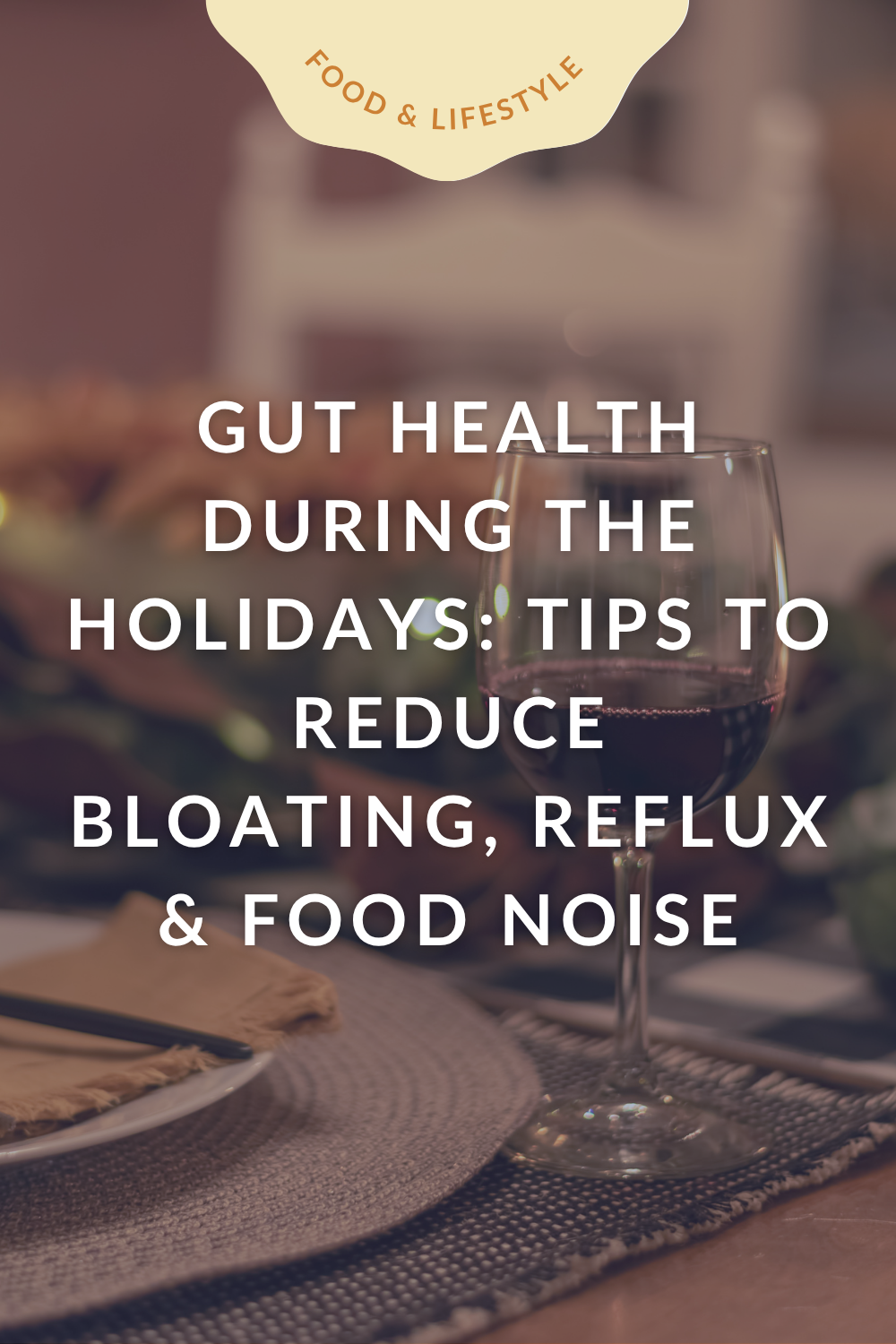Gut Health During the Holidays: Tips to Reduce Bloating, Reflux & Food Noise
The holidays are meant to be joyful and delicious, but for many people, the season also brings uncomfortable bloating, reflux, and unpredictable digestion. Hyper-fixation on meals, late nights, and a swirl of diet culture chatter can leave your gut feeling anything but festive.
The good news? You can protect your digestive health while enjoying every bite and maintaining a feel-good food relationship.
Below are simple, science-backed strategies to help you feel comfortable and confident all season long.
Why Your Gut Might Feel Off This Time of Year
It’s not your imagination - many people notice more bloating, irregularity, or general gut discomfort during the holidays. Between stress, travel, and shifts in eating patterns, your digestive system is working overtime to adapt. Here’s why, and what’s happening beneath the surface.
Stress and the mind-gut connection
Your gut and brain communicate constantly through the gut-brain axis. When stress levels rise - which they often do around the holidays - cortisol and adrenaline can alter gut motility and enzyme secretion. This means food moves either too quickly (leading to loose stools) or too slowly (causing bloating and constipation).Shifts in routine
Your gut thrives on rhythm. Late nights, skipped meals, time zone changes, and holiday travel can disrupt your circadian rhythm — which regulates digestion, appetite, and bowel movements. These changes can delay gastric emptying or alter hunger cues.
Less fibre-dense meals
Depending on where you are in the world, traditional festive foods may be richer and lower in fibre. Fibre adds bulk to stool and helps maintain smooth intestinal transit, so when intake drops, digestion can feel heavier or slower.Food noise and diet culture
The holidays are filled with “detox” messages and body talk, which can heighten anxiety and guilt around food. Chronic stress and negative body thoughts activate the same nervous system pathways that influence gut sensitivity and motility.
When Is It A “Problem?”
What’s worth paying closer attention to are new or persistent symptoms, such as:
Painful bloating or excess gas
Noticeable or frequent changes in bowel habits
Discomfort that interferes with daily life
If these symptoms feel ongoing or out of the ordinary for you, it might be time to take a closer look at your digestive health. A registered dietitian can help identify possible triggers, support your gut function, and guide you toward feeling more comfortable day to day.
Simple Habits to Support Your Gut Through the Holidays
Digestive symptoms often flare this time of year, not because you’ve done anything “wrong,” but because your gut is sensitive to changes in stress, sleep, movement, and food rhythm. Supporting digestion doesn’t mean restriction; it’s about consistency, awareness, and compassion for your body’s cues.
1. Keep a Consistent Meal Rhythm
Skipping meals or “saving up” for a big dinner can backfire by dysregulating blood sugar and gut motility. Long gaps without eating can increase gastric acid secretion and slow colonic transit, which may worsen reflux or constipation for some people.
Your digestive tract works best with a steady routine, think of it as training a muscle. Balanced meals and snacks spaced throughout the day (with a mix of protein, fibre, and fats) help stabilize energy and keep your gut’s natural rhythm intact.
2. Hydrate & Move Gently
Adequate hydration supports stool consistency and digestive enzyme function, while light movement after meals - even a 10-minute walk - helps stimulate the migrating motor complex (your gut’s natural “clean-up” wave).
Hydration doesn’t have to mean plain water: warm herbal teas, sparkling water, or carbonated water all contribute. Exercise doesn’t have to mean “earning” food, it can simply be moving in a way that feels good.
3. Set Boundaries Around Diet Talk
Holiday gatherings can sometimes bring unhelpful food or body comments. These can trigger stress and activate the same nervous system pathways that influence digestion. Protecting your emotional space is a gut health strategy in itself.
Try gentle phrases like, “I’m focusing on enjoying the meal, not analyzing it,” or simply changing the topic. Supporting your mental wellbeing keeps your gut-brain axis calm and your digestion more stable.
4. Savour Without Stress
Your body is built to handle variety, including richer, lower-fibre meals during the holidays. The key is to enjoy them without overthinking or putting these foods on a pedestal. Many holiday digestive discomforts aren’t caused by the food itself - it’s often the “simple” act of eating more than your body can comfortably handle. That’s it!
Often, we push past comfort because of thoughts like “this is the last time I’ll eat this” or “I’m so bad for having this”. Moral judgments about food that add stress. This mindset can make you eat faster, ignore fullness cues, or eat more than comfortable, which can lead to bloating, gas, or reflux.
Eating under stress also activates the sympathetic (“fight or flight”) response, which slows digestion. When you allow yourself to eat without guilt, tune into your comfort level, and savour the meal, you engage the parasympathetic (“rest and digest”) system, supporting smooth gut motility and overall comfort.
Reframe your approach: holidays can include food without your life revolving around it. You likely can enjoy the foods you love - just notice whether discomfort comes from pushing past your comfort, stress, or truly intolerable foods. Tuning into your body and eating mindfully helps digestion and keeps your nervous system calm.
Quick Relief for Bloating or Reflux
When discomfort does happen, small, consistent strategies can help more than any “cleanse”:
Peppermint tea – naturally relaxes smooth muscle in the GI tract, easing bloating.
Easy-to-digest foods later on – like oatmeal, bananas, or broth-based soups, can give the gut a gentle rest.
Stay upright for 20–30 minutes after meals – gravity helps keep acid and food moving in the right direction.
Avoid overly tight waistbands – gentle, practical support for reflux relief.
Reframe the Holiday Mindset
Instead of focusing on control or “getting back on track,” try grounding yourself in balance and connection.
Practice gratitude for the nourishment, flavors, and memories food provides.
Tune into your body in ways that work for you. If you don’t experience typical hunger or fullness cues, check in with other signals like energy levels, satisfaction, or comfort. Using structure, planned portions, or mindful pacing can also help support digestion and prevent discomfort.
Remember that your gut (and your body) are adaptable and resilient - there’s no one “right” way to eat or enjoy the holidays.
Bottom Line
The holiday season doesn’t have to mean digestive discomfort beyond reason. Finding a rhythm that works for you - whether that’s keeping meals consistent, staying hydrated, moving gently, or letting go of food guilt - can help you enjoy the celebrations while feeling good in your gut.
If you notice persistent symptoms like bloating, reflux, or irregularity, a registered dietitian with a special focus on gut health can help you identify strategies tailored to your body and lifestyle. Small, consistent habits, adjusted to what feels doable for you, can make a meaningful difference and help you enter the new year feeling nourished, comfortable, and at ease!
Hi! I’m Trista
A Registered Dietitian and reproductive health expert. I’m here to help you gain confidence to overcome your Polycystic Ovary Syndrome and digestive health woes, while bettering your relationship with food.
CATEGORIES
Ready to find real hormonal relief with your PCOS?
Download the PCOS Symptom Tracker & Labs Checklist to track your progress and see how your meals affect your health. It’s an easy way to align your food choices with your body’s needs and feel your best!













